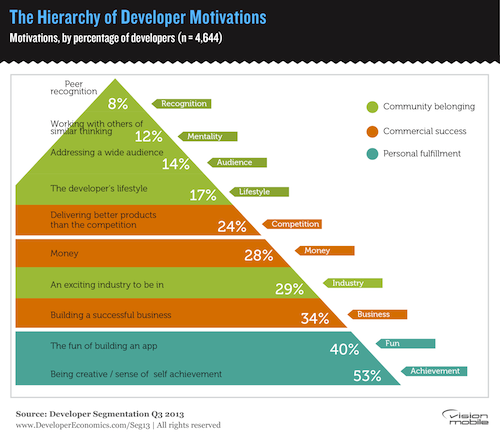ReadWritePredict is a look ahead at the technology trends and companies that will shape the coming year.
There has never been a better time to be in software, and the hiring trends prove it. According to Dice.com’s semi-annual report, tech hiring is at unprecedented levels. For tech professionals, this means that now is the time to ask for a better, higher-paying job.
Which may not actually be what developers want.
Tech Hiring Is Eating The World
Forget partying like it’s 1999. As software becomes essential to the operation of all business, tech professionals are seeing their stock rise to record-breaking levels, as Dice.com’s December hiring report reveals.
To wit:
- 75% of recruiters anticipate hiring more tech professionals in the first six months of 2015 than the last six months of 2014, up from 70% in June 2014;
- 72% of companies are planning to expand by more than 10% in early 2015, up from 68% in June 2014 and 65% in December 2013;
- Because of this demand, 64% of hiring managers report having candidates ask for more money (up from 61% in June 2014); and
- 40% of hiring managers report an increase in “take this job and shove it” voluntary departures, a 6-point jump from June 2014.
These are unprecedented levels of hiring for Dice’s semi-annual survey, and suggests, yet again, that software is eating the world. After all, most of these jobs aren’t being posted by Silicon Valley startups. Instead mainstream enterprises are desperately seeking software talent.
Money Can’t Buy Me Love
Despite the competition for talent, money ultimately may not be what tech professionals, and especially developers, want most. Companies seeking to entice developers should pay attention.
Ruurd Keizer, for example, asks why developers don’t make millions of dollars (of course, some do). The answer, he notes, is that “great developers love what they do … simply playing with new technologies and writing awesome code.” Greg Kroah-Hartman, a top Linux kernel maintainer, says it this way: “As for a hobby, it’s a real problem, my hobby became my job so then what do I do for a hobby?”
The problem for developers, however, is that in a larger enterprise, they’re buried under layers of management that can’t recognize just how potent their contributions are. Keizer writes:
Even if a great developer manages to pass this indiscriminate hiring wall, and turns out to be a real asset, between him and the CEO there are 9001 layers of management, each of which has to earn more than the last, irrespective of their actual contribution to the company. In this sense the position of developers is much like the one of coffee bean farmers, in that a very small percentage of the money reaches the ones creating the actual product. This still wouldn’t be a problem if development was a more visible art, like sports or music. Developers would be recognized as the creative force and the discrepancy would be impossible to sell to a larger audience.
All of which is true. But in my experience it’s that “love of coding” that most inspires developers. Money really inspires no one.
VisionMobile has actually studied this, and found that most developers want the ability to express themselves through code, not mountains of money:

Recruit And Retain
All of which suggests that if you’re trying to hire great technical talent, money can’t be the only perk you offer. Companies like Facebook, Twitter and Netflix, for example, actively encourage their developers to contribute to open-source projects, as this satisfies both the need for community and the “fun” aspect of developer desires noted above.
The other key ingredient, as former Netflix cloud chief Adrian Cockroft highlights, is cloud. Otherwise put, the more you can do to get developers in the door and then get out of their way, the better.
Hiring managers seem to be getting the message. According to the Dice.com report, 43% of those surveyed report seeing more counteroffers from a recruit’s existing employer, up from 33% just six months prior. The competition for tech talent, in short, is fierce.
Better give developers what they want. Money is only part of it.










